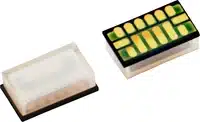A laser diode is changing LiDAR technology, offering precision in distance measurement and spatial recognition. Read more!

ROHM has developed the RLD8BQAB3, a high-output laser diode for use in Advanced Driver Assistance Systems (ADAS) equipped with LiDAR for distance measurement and spatial recognition. Initial samples will target consumer and industrial applications, including drones, robot vacuums, Automated Guided Vehicles (AGVs), and service robots.
LiDAR is increasingly used in applications requiring automation, such as automotive ADAS, AGVs, drones, and robot vacuums, enabling distance measurement and spatial recognition. Laser diodes are needed to improve detection over longer distances with greater precision as light sources are capable of high kilowatt-level output and proximity multi-source light emission.
The company claims to develop a patented technology to achieve narrow laser emission widths, supporting long-range and precise LiDAR performance. This began with the 25W RLD90QZW5 in 2019 and the 120W RLD90QZW8 in 2023. Building on these developments, ROHM now offers the 125W 8-channel (1kW-class) array-type RLD8BQAB3 to meet the demand for high-output laser diodes.
The company offers a surface-mount infrared laser diode with a 125W × 8-channel output, designed for LiDAR applications using 3D ToF systems for distance measurement and spatial recognition. It has eight emission areas (each 300µm wide) per element, mounted on a sub-mount attached to a heat-dissipation substrate.
The package includes a clear glass cap on its emitting surface, a first for surface-mount laser diodes, which prevents light scattering caused by scratches during dicing, a common issue with resin-encapsulated designs, and maintains beam quality. Each emission area is wired with a common cathode, allowing flexible irradiation methods to suit application needs, including individual emission for more light-emitting points or simultaneous emission at 1kW-class output.
The key characteristics include uniform emission intensity across the width and a low wavelength temperature dependence of 0.1nm/°C. Its array design reduces areas of lower emission intensity between channels, while a bandpass filter reduces interference from ambient light sources, supporting long-distance detection and detailed LiDAR performance.









